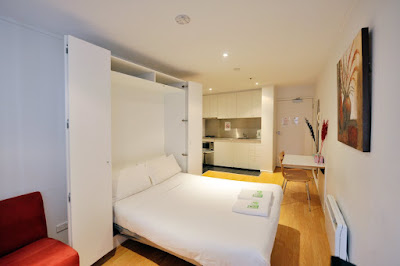Rent a One Bedroom Apartment
 Whether you are leaving your parents' home to live on your own, renting your first apartment after college or searching for your next one bedroom rental, there are several steps you should take to ensure your rental experience runs smoothly. Renting the right apartment takes more than merely making monthly payments to a landlord. New renters must consider price, location, condition of the apartment, the personality of the landlord and rental insurance before signing a lease.
Whether you are leaving your parents' home to live on your own, renting your first apartment after college or searching for your next one bedroom rental, there are several steps you should take to ensure your rental experience runs smoothly. Renting the right apartment takes more than merely making monthly payments to a landlord. New renters must consider price, location, condition of the apartment, the personality of the landlord and rental insurance before signing a lease.Set a budget for your monthly rental expenses. Ideally, you should rent an apartment that costs less than 30% of your monthly income. By doing this, you’ll allow yourself funds for other financial obligations and savings account. Keep in mind the cost of an apartment is not merely rent. It may also include utilities such as gas, electric, water/sewer, trash, fees for the use of community property such as swimming pools and tennis courts, and rental insurance. Sometimes one or more of these costs will be included in your rent, however, you should plan for additional expenses associated with a one-bedroom apartment.
Select a location. Before you can start searching for apartments, you must familiarize yourself with the area, especially if you are coming from out of town. Most people chose a rental unit because it is close to their job, school or family. Ask your co-workers, fellow students or family members for neighborhood recommendations. A few additional details you should consider when selecting a neighborhood is the crime rate (this information can be obtained by contacting the local police department), the accessibility of grocery stores and other shopping centers and entertainment options.
Search local newspapers for rental listings in your price range. Often, newspapers will contain listings offered by private landlords (as opposed to a property investment company). Pick up free rental guides from grocery stores and gas stations. Most of the rentals listed in these types of guides are professionally managed apartment communities. Also check online at property listing sites such as “For Rent” or online classifieds such as “Craigslist.com.” A final option is to walk or drive around the neighborhood. When a property is available for rent, many landlords will place rental signs in the front yard or window of the property with contact information.
Create a list of one-bedroom apartments within your price range. Call the landlord or leasing agency of each property you are interested in to set up an appointment to view the apartment. Prepare a wish list of items you are looking for in your new apartment. Take a notepad and pencil to make notes during your tour. Prepare a list of questions to ask the landlord about the apartment such as which utilities the tenant is responsible for, whether parking is available and included in the price of the rent, whether pets are allowed, whether the tenant is allowed to paint the walls and what the other tenants in the building are like. Take note of the condition of the apartment and any items that appear to be in disrepair. Ask the landlord if such items will be repaired before a tenant moves in.
Assess the total costs of your apartment options (including utilities) and select the apartment that is the best value. The cheapest apartment is not always the best. For example, Apartment A is $500 per month but is located in a high-crime area where parking is not included and there is no washer and dryer in the unit. Apartment B is $600 per month with parking included, located in a relatively peaceful, well kept neighborhood and the unit comes with a washer and dryer. Apartment B is the better value. Parking costs in some cities can cost over $100 a month. Traveling to and using laundry mat will eat up an hour or two of your time each week and approximately $3 per load. Renting in a high crime area could increase your rental insurance premiums.
Complete a rental application. You will need to provide information about yourself such as your current address and contact information, your social security and driver’s license numbers, current income and any prior landlords or leasing companies you have rented from in the past. The purpose of the rental application is for the landlord to check your credit history and references. If you have a history of not paying your bills on time or at all, you may not be approved to rent the apartment on your own. Similarly, if you breached your prior rental lease agreement or left the apartment in disrepair, your application may be rejected. Many landlords will permit the use of a “co-signer” for rental applicants with low incomes and poor credit histories. A “co-signer” agrees to pay your rent in the event that you fail to do so.
Read and sign your lease. Landlords will provide a lease agreement or contract for you to sign before you are allowed to take possession of the apartment. Read the lease carefully before you sign. Many leases contain very strict provisions regarding house guests, pets, repairs and other tenant responsibilities. If a landlord promised repairs would be made before you move in or that certain utilities would be included in the rent, make sure that those items are reflected in the lease.
Pay a security deposit if required. Most landlords require a security deposit equal to the amount of two months rent. The purpose of the security deposit is to compensate the landlord for any damages you may cause while living in the apartment. Your security deposit will be returned to you, minus any deductions for damages or unpaid rent, when you move out. Before you move in, it is a good idea to do a “walk-through” with the landlord to identify any damages that exist. Write down and take photographs of broken items, dented appliances or carpet stains and have the landlord sign off on the damages. This way you will not be held responsible for damages you did not cause.
Obtain rental insurance. Rental insurance is relatively inexpensive and protects you in the event that you cause damage to the apartment, such as fire, someone becomes injured while visiting your apartment or if a burglar breaks in and steals your belongings. Rental insurance can be obtained from most major insurance companies. If you currently have car or motorcycle insurance, check with your current insurance carrier. Often you will receive a discount for adding additional policies to your account.











Comments
Post a Comment